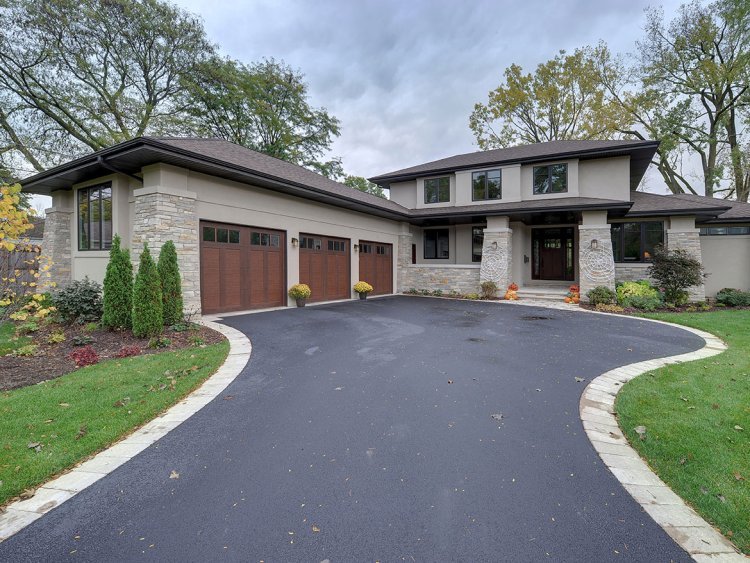Top Eco-Friendly Benefits of Asphalt Driveways

When it comes to choosing a driveway material, many homeowners focus on durability, cost, and aesthetics. But have you ever considered the environmental impact of your choice? Asphalt is not just strong and cost-effective—it’s also one of the most sustainable driveway options available. Thanks to its recyclability, energy efficiency, and minimal environmental footprint, asphalt is an eco-friendly solution for modern homes. If you're exploring asphalt driveway design, here’s why it’s a smart and sustainable option.
1. Asphalt Is 100% Recyclable
Why Recycling Matters
One of the biggest environmental advantages of asphalt is its recyclability. Unlike other materials that end up in landfills, old asphalt can be removed, crushed, and reused in new paving projects.
How Asphalt Recycling Works
- Old asphalt is milled and processed into new pavement.
- It reduces the need for fresh raw materials.
- The process saves energy and minimizes waste.
This closed-loop system makes asphalt one of the most sustainable construction materials available today.
2. Reduces Landfill Waste
Less Waste, More Sustainability
Millions of tons of asphalt are recycled each year, significantly reducing landfill waste. Since asphalt can be reused indefinitely without losing quality, it prevents unnecessary disposal of construction materials.
The Environmental Impact
- Keeps waste out of landfills.
- Lowers carbon emissions associated with waste disposal.
- Reduces the demand for new raw materials like gravel and sand.
Choosing an asphalt driveway means contributing to a more sustainable, circular economy.
3. Energy-Efficient Production and Installation
Lower Energy Consumption
Compared to other paving materials like concrete, asphalt requires less energy to produce. The manufacturing process has improved over the years, reducing its carbon footprint.
Efficient Installation Process
- Asphalt driveways take less time to install, reducing energy usage.
- The process requires fewer heavy-duty machines than concrete.
- Faster curing times mean less energy is spent on prolonged site operations.
By choosing asphalt, you’re opting for a driveway with a lower environmental impact from production to installation.
4. Asphalt Reflects Heat Efficiently
Why Heat Absorption Matters
Asphalt surfaces, particularly porous or cool-mix versions, help reduce the urban heat island effect—where cities become significantly hotter due to heat-absorbing surfaces.
Eco-Friendly Asphalt Options
- Porous asphalt allows water to filter through, cooling the surface.
- Cool-mix asphalt reflects more sunlight, reducing heat absorption.
These innovations help keep local temperatures lower, reducing the need for excessive air conditioning in nearby buildings.
5. Supports Proper Stormwater Management
How Asphalt Helps with Drainage
Traditional driveways can create runoff problems, leading to erosion and water pollution. However, asphalt offers environmentally friendly drainage solutions.
Benefits of Permeable Asphalt
- Allows water to seep through, replenishing groundwater.
- Reduces the risk of flooding and erosion.
- Filters out pollutants before water reaches natural water sources.
A well-designed asphalt driveway can be a part of an eco-friendly water management system.
6. Lower Carbon Footprint Compared to Concrete
Why Asphalt Beats Concrete in Sustainability
Concrete driveways may seem like a strong alternative, but they come with a much higher carbon footprint. The production of cement, a key ingredient in concrete, is one of the largest contributors to CO₂ emissions globally.
How Asphalt Reduces CO₂ Emissions
- Requires less energy to produce than concrete.
- Can be laid at lower temperatures, reducing fuel consumption.
- Uses recycled materials, reducing the need for new resources.
Choosing asphalt over concrete is a step toward a greener future.
7. Longevity Means Less Environmental Impact
A Driveway That Lasts Decades
A well-maintained asphalt driveway can last up to 30 years. The longer your driveway lasts, the fewer resources are needed for repairs and replacements.
Sustainable Maintenance Practices
- Sealcoating protects against wear and tear.
- Prompt repairs prevent the need for full resurfacing.
- Routine cleaning reduces the buildup of harmful chemicals.
By investing in maintenance, you extend the life of your driveway while reducing environmental waste.
8. Reduces Noise Pollution
A Quieter Paving Solution
Did you know that asphalt is also beneficial for reducing noise pollution? Roads and driveways made from asphalt create a smoother and quieter driving experience.
Why This Matters for the Environment
- Less noise means a more peaceful living space.
- Reduces noise pollution in urban areas.
- Makes roads and driveways more enjoyable for people and wildlife.
If you want a driveway that’s both eco-friendly and peaceful, asphalt is an excellent choice.
9. Asphalt Enhances Local Air Quality
Minimizing Airborne Dust and Particles
Some paving materials contribute to air pollution by releasing dust and fine particles into the air. Asphalt, especially when properly sealed, helps keep air quality clean.
How Asphalt Supports Cleaner Air
- Generates fewer dust particles compared to gravel.
- Reduces the need for chemical-heavy maintenance.
- Helps prevent air pollution caused by alternative materials.
Improved air quality benefits both homeowners and the surrounding environment.
10. Supports Green Initiatives and Government Sustainability Goals
The Future of Eco-Friendly Paving
Many governments and environmental agencies recognize asphalt as a key player in sustainable infrastructure. Its recyclability and energy-efficient properties align with long-term sustainability goals.
How Homeowners Can Contribute
- Opt for recycled asphalt in your driveway project.
- Choose permeable asphalt for better water management.
- Work with eco-conscious contractors who follow sustainable practices.
By choosing asphalt, you’re making an environmentally responsible decision that aligns with global green initiatives.
Final Thoughts
When it comes to eco-friendly paving options, asphalt driveways stand out as a top choice. From being 100% recyclable to offering energy-efficient installation and reducing landfill waste, asphalt is a material that supports sustainability.
If you’re planning to install or upgrade your driveway, consider asphalt driveway design that incorporates eco-friendly features like permeable surfaces and recycled materials. A greener driveway means a greener planet—without sacrificing durability or style.
What's Your Reaction?











